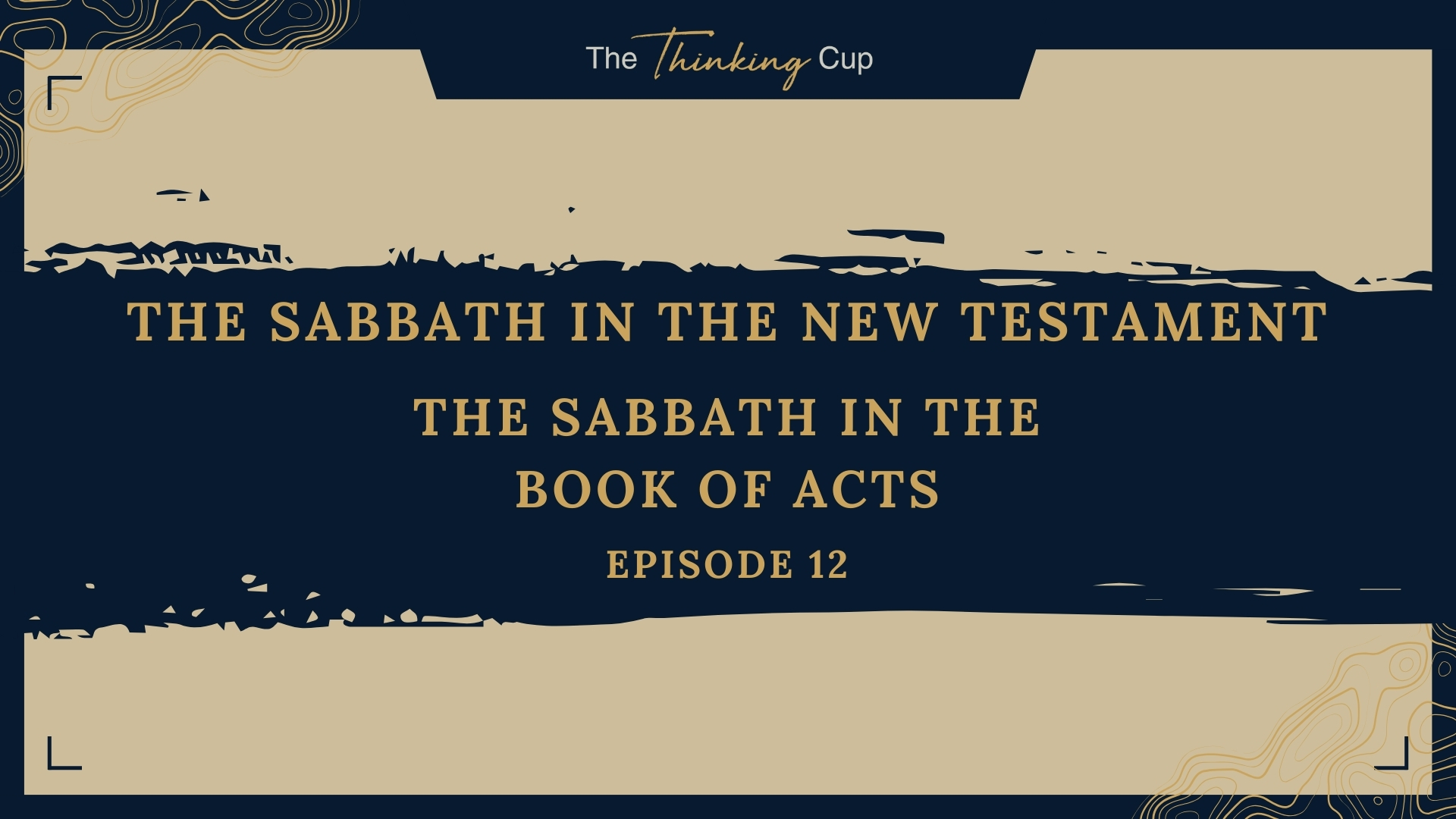The Book of Acts mentions the Sabbath a total of nine times. However, an examination of these references reveals that none of them provide a basis for mandatory Sabbath observance among either Jewish or Gentile believers.
The first mention of the Sabbath occurs in Acts 1:12, where it is used as a measurement of distance (a Sabbath day’s journey), approximately 3,000 feet.
“Then they returned to Jerusalem from the mount called Olivet, which is near Jerusalem, a Sabbath day’s journey away.” (Acts 1:12, ESV)
The phrase “a Sabbath day’s journey” in Acts 1:12 is a cultural reference rather than an endorsement of mandatory Sabbath observance. This term, which refers to a traditional Jewish measurement of distance (~3,000 cubits or about 0.6 miles ), originated from rabbinic interpretations [1] of passages like Exodus 16:29 and Numbers 35:5.
“A “Sabbath day’s journey” was proper by pharisaic rule, though the distance varied with the size of cities, and probably was without rule by the real Scriptures.[2]
By the time of Acts, it had become a standard way to describe distance rather than a legal requirement. Furthermore, the text does not indicate that this journey took place on a Sabbath; the phrase simply provides geographical context for Luke’s audience. Additionally, the New Testament does not reinforce Sabbath travel restrictions as binding for Christians. Jesus frequently challenged Pharisaic Sabbath regulations (Mark 2:27–28; Luke 6:1–5), and Paul later affirms that believers are not to be judged regarding Sabbath observance (Colossians 2:16–17; Romans 14:5). Luke, the author of Acts, often uses Jewish terminology to provide historical context without imposing Jewish legal obligations—just as he mentions the Jewish hour of prayer (Acts 3:1) or Peter’s adherence to kosher laws before his vision (Acts 10:9–16). Therefore, the reference to a Sabbath day’s journey in Acts 1:12 does not indicate a continued Sabbath mandate but simply reflects a familiar Jewish way of describing distance.
The remaining mentions of the Sabbath occur in the context of synagogue services (Acts 13:14, 27, 42, 44; 15:21; 16:13; 17:2; 18:4). These passages describe Jewish unbelievers engaging in their customary worship practices in the synagogue, with Paul attending these services for evangelistic purposes. Nowhere do these passages indicate that Jewish or Gentile believers gathered for church meetings on the Sabbath. Instead, those who came to faith through Paul’s preaching in the synagogue eventually separated to form local churches. There is no record in Acts of these early Christian churches meeting on the Sabbath for the purpose of corporate worship.
While Jewish believers were present in synagogues during this period, their participation did not equate to a corporate gathering of the Church. Several reasons might explain why Jewish believers continued to observe the Sabbath in some capacity, particularly in Israel. These could include personal habits, social pressure, fear of sanctions, missionary strategy (as seen in Paul’s outreach), conservative leadership in Jerusalem, or theological convictions. However, at no point does the Book of Acts command Jewish believers to observe the Sabbath as a day of worship or rest. Furthermore, there is not a single example of a local church—Jewish or Gentile—holding its meetings on the Sabbath.
Two other passages in Acts are sometimes cited in discussions about Sabbath observance. The first is Acts 15:1–29, which records the Jerusalem Council’s decision regarding the role of the Law of Moses for Gentile believers. Initially, the issue revolved around circumcision (Acts 15:1), but it later expanded to include the broader question of whether Gentile believers were required to observe the Law of Moses (Acts 15:5). While the council’s ruling primarily addressed Gentile believers, Peter’s statement in verse 10 is particularly relevant:
“Now, therefore, why are you putting God to the test by placing a yoke on the neck of the disciples that neither our fathers nor we have been able to bear?” (Acts 15:10, ESV)
Here, Peter refers to the Law of Moses as a yoke that neither the Jewish ancestors nor the contemporary Jewish believers could fully bear. (A continued thought from Acts 15:5) If the Jewish people themselves struggled under the law, it made no sense to impose it upon Gentile believers. The council concluded that Gentiles were not obligated to be circumcised or to keep the Mosaic Law, and Peter’s words strongly suggest that Jewish believers were also no longer bound to it. Although the passage does not explicitly address Sabbath observance, it is significant that the council did not include Sabbath-keeping as a requirement for Gentiles, nor did it reaffirm it for Jewish believers.
Instead, Peter stood up and exclaimed to the council that both Jew and Gentile would be “saved through the grace of the Lord Jesus.” (Acts 15:11, ESV) He then proceeded to conclude these few things that the early church should be attentive to for creating unity in the early culturally inclusive church:
-
- Abstain from the things polluted by idols
- Abstain from sexual immorality
- Abstain from what has been strangled and from blood.
Nothing in the conclusion of this early church council would posit that mandating the Sabbath was a requirement for the early Christian church.
The second passage is Acts 21:20–24, where Paul is confronted with rumors that he was teaching Jewish believers to abandon the Law of Moses. In response, he agrees to participate in a purification ritual to demonstrate that he still respects the law. The passage states:
“And when they heard it, they glorified God. And they said to him, “You see, brother, how many thousands there are among the Jews of those who have believed. They are all zealous for the law, and they have been told about you that you teach all the Jews who are among the Gentiles to forsake Moses, telling them not to circumcise their children or walk according to our customs. What then is to be done? They will certainly hear that you have come. Do therefore what we tell you. We have four men who are under a vow; take these men and purify yourself along with them and pay their expenses, so that they may shave their heads. Thus all will know that there is nothing in what they have been told about you, but that you yourself also live in observance of the law.” (Acts 21:20–24, ESV)
While this passage acknowledges that many Jewish believers in Jerusalem were zealous for the law, it does not establish Sabbath-keeping as a requirement. Their zeal for the law encompassed more than just the Sabbath—it included ceremonial and civil regulations as well. The passage simply demonstrates that Jewish believers had the freedom to observe elements of the law if they chose to do so, but it does not mandate that they must. The presence of Jewish believers who continued practicing aspects of the law does not indicate that all Jewish believers or Gentile believers were required to do the same.
In Conclusion
The Book of Acts provides no support for mandatory Sabbath-keeping among Jewish or Gentile believers. While the Sabbath is mentioned in relation to synagogue services, these references pertain to Jewish unbelievers, and Paul’s presence in these settings was for evangelistic purposes, not to establish a pattern for Christian worship. Furthermore, the Jerusalem Council in Acts 15 makes it clear that Gentile believers are not required to observe the Law of Moses, and Peter’s statement implies that Jewish believers were also no longer obligated to do so. Acts 21 confirms that Jewish believers had the freedom to continue aspects of the law if they chose, but it does not prescribe Sabbath observance as a requirement.
Ultimately, nowhere in Acts is the Church instructed to observe the Sabbath, and there is no example of a local church meeting on the Sabbath. The text’s silence on this matter further proves that Sabbath observance is neither required nor expected under the New Covenant.
In Christian Love,

[1] The Rabbis perverted Scripture (Ex. 16:29) and, without authority, made a Sabbath-day journey to be anywhere within a city and two thousand cubits outside of it.
[2] William Deloss Love, “A Christian Sabbath in the New Dispensation: Biblical and Patristical Evidence,” Bibliotheca Sacra 38, no. 151 (1881): 531.




0 Comments